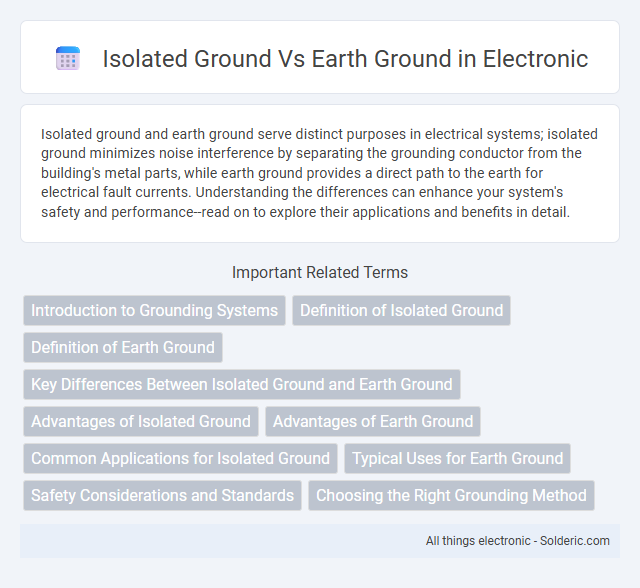Isolated ground and earth ground serve distinct purposes in electrical systems; isolated ground minimizes noise interference by separating the grounding conductor from the building's metal parts, while earth ground provides a direct path to the earth for electrical fault currents. Understanding the differences can enhance your system's safety and performance--read on to explore their applications and benefits in detail.
Comparison Table
| Feature | Isolated Ground | Earth Ground |
|---|---|---|
| Definition | Dedicated grounding conductor isolated from other grounds, preventing interference. | Connection to the physical earth for electrical safety and equipment protection. |
| Purpose | Minimizes electrical noise and interference in sensitive equipment. | Provides safety by dissipating fault currents into the ground. |
| Connection | Separated from earth ground, routed directly to grounding busbar. | Connected to earth rod, grounding grid, or conductive soil. |
| Use Case | Audio, medical, and precision electronic equipment requiring noise reduction. | General electrical systems for safety and code compliance. |
| Code Compliance | Must meet NEC requirements (e.g., NEC 250.146). | Required by most national electrical codes for electrical safety. |
| Noise Reduction | Effective in reducing ground loops and electrical interference. | Standard grounding with no special noise mitigation. |
| Cost | Higher installation cost due to isolation and dedicated wiring. | Lower cost, standard practice in electrical installations. |
Introduction to Grounding Systems
Isolated ground systems use a dedicated conductor to separate sensitive electronic equipment from noise and interference found in standard earth ground, improving signal integrity and reducing electrical noise. Earth ground connects electrical systems directly to the physical earth, providing a safety path for fault currents and stabilizing voltage levels. Understanding the differences helps you design effective grounding solutions tailored to your equipment's performance and safety requirements.
Definition of Isolated Ground
Isolated ground is a dedicated grounding conductor separated from the building's main earth ground to reduce electrical noise and interference in sensitive electronic equipment. This grounding method minimizes ground loops and ensures cleaner signal integrity by isolating the equipment from potential electrical noise in the earth ground system. Your choice of isolated ground can significantly enhance the performance of audio, medical, and IT systems by providing a stable, noise-free grounding path.
Definition of Earth Ground
Earth ground refers to a direct electrical connection to the physical earth, designed to provide a stable reference point for electrical systems and a safe path for fault currents. This grounding method helps protect equipment and personnel by dissipating excess electricity into the ground, minimizing shock hazards and electrical interference. Understanding earth ground is essential for ensuring your electrical installations comply with safety standards and function reliably.
Key Differences Between Isolated Ground and Earth Ground
Isolated ground refers to a dedicated grounding path separated from the building's main grounding system to minimize electrical noise and interference, often used in sensitive electronic equipment. Earth ground connects directly to the physical earth, providing a reference point for electrical systems and safety by dissipating fault currents safely into the ground. Understanding these key differences helps you optimize your electrical system's safety and performance by choosing the appropriate grounding method.
Advantages of Isolated Ground
Isolated ground systems prevent electrical noise interference by separating the ground path from the building's earth ground, enhancing sensitive equipment performance in audio, medical, and IT environments. This isolation reduces the risk of ground loops and electromagnetic interference, ensuring cleaner signal transmission and improving overall equipment reliability. Your devices benefit from increased protection against electrical disturbances, leading to more stable and accurate operation.
Advantages of Earth Ground
Earth ground offers superior safety by effectively dissipating electrical faults and lightning strikes into the earth, reducing the risk of electric shock and equipment damage. It provides a stable reference point for electrical systems, minimizing voltage fluctuations and enhancing overall system performance. Your electrical installations benefit from improved noise reduction and reliable grounding that supports sensitive electronic devices and prevents interference.
Common Applications for Isolated Ground
Isolated ground systems are commonly used in sensitive electronic environments such as hospitals, laboratories, and data centers to minimize electrical noise and interference. These systems ensure a dedicated grounding path separate from the earth ground, reducing the risk of ground loops and signal distortion. Isolated ground improves the reliability and safety of medical equipment, precision instruments, and communication systems by providing stable reference points free from electrical disturbances.
Typical Uses for Earth Ground
Earth ground is commonly used in residential and commercial electrical systems to provide a safe path for fault currents and stabilize voltage levels. It ensures protection against electrical shock by diverting stray currents away from conductive surfaces. Your electrical devices rely on earth ground to maintain proper operation and safety standards.
Safety Considerations and Standards
Isolated ground systems reduce electrical noise by separating the grounding conductor from the building's earth ground, enhancing safety in sensitive electronic environments. Earth ground provides a direct path to the earth, essential for dissipating fault currents and preventing electric shocks according to NEC (National Electrical Code) standards. Understanding your installation's specific safety requirements ensures compliance with OSHA regulations and avoids potential hazards in electrical grounding practices.
Choosing the Right Grounding Method
Choosing the right grounding method depends on the electrical system's sensitivity and noise requirements. Isolated ground provides a dedicated path to prevent electrical noise interference, ideal for sensitive audio or data equipment, while earth ground offers a general safety connection to prevent electrical shock and equipment damage. Consider your system's vulnerability to electrical noise and safety standards when determining whether isolated or earth grounding best protects your devices and ensures optimal performance.
isolated ground vs earth ground Infographic

 solderic.com
solderic.com